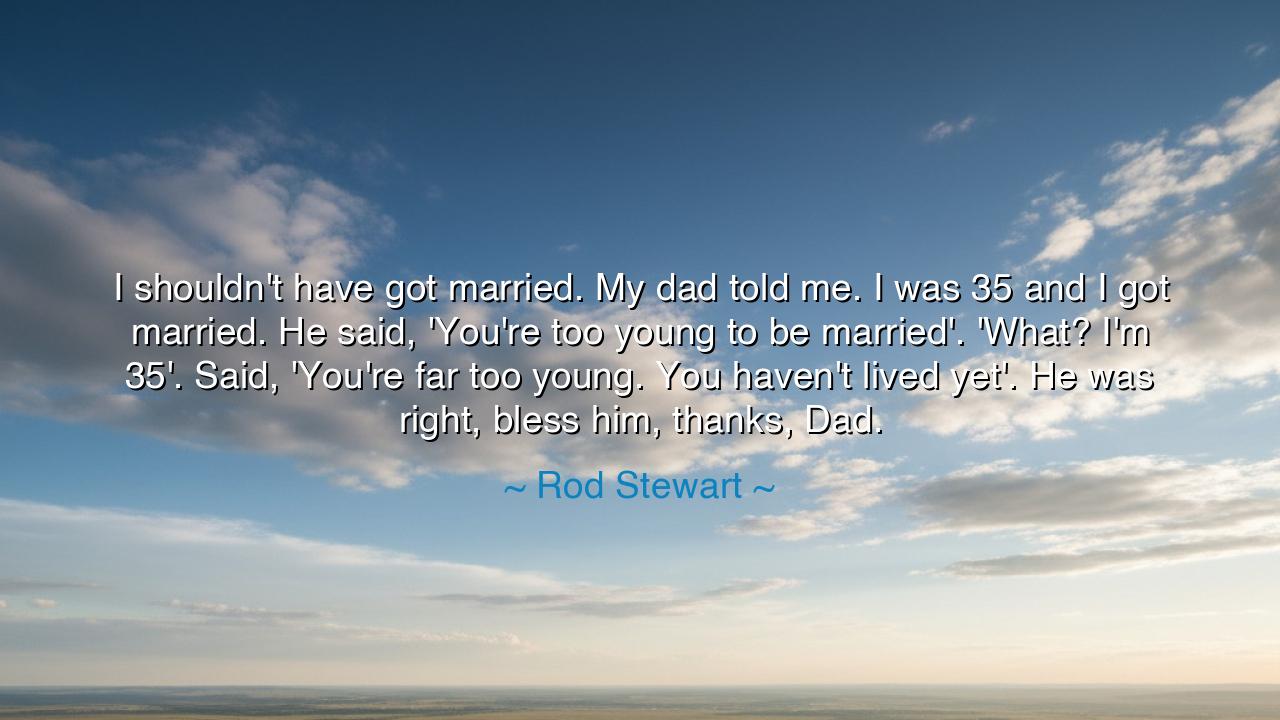
I shouldn't have got married. My dad told me. I was 35 and I got
I shouldn't have got married. My dad told me. I was 35 and I got married. He said, 'You're too young to be married'. 'What? I'm 35'. Said, 'You're far too young. You haven't lived yet'. He was right, bless him, thanks, Dad.






Listen well, children of the ages yet to come, and absorb the wisdom woven into the words of Rod Stewart, who confessed: “I shouldn't have got married. My dad told me. I was 35 and I got married. He said, 'You're too young to be married'. 'What? I'm 35'. Said, 'You're far too young. You haven't lived yet'. He was right, bless him, thanks, Dad.” In this tale, there lies a truth both timeless and profound: that life’s fullness is measured not merely by years, but by experience, by growth, and by the richness of the journey before committing oneself to a lifelong path.
The ancients long held that wisdom is the offspring of experience. The philosopher Seneca warned that rushing into life’s great commitments without knowledge of one’s own heart and capacities leads to folly. Rod Stewart’s father, in his quiet foresight, echoed this eternal principle: one may be old in years yet still young in spirit and understanding. To marry without living fully first is to bind oneself to chains of inexperience, however gilded they may appear.
Consider the great kings and heroes of old, who often delayed marriages and alliances until they had proven themselves in the crucible of life. Alexander the Great, though a prince, was not yet wed when he embarked on his conquests, for he understood that mastery of self and the world must precede union with another. Rod Stewart’s father, with a simple, loving admonition, was guarding his son against the same peril: to enter the sacred covenant of marriage without the wisdom that comes from living widely, freely, and deeply.
There is also in this tale the profound lesson of listening to those who have walked before us. Parents, elders, and mentors hold a mirror to our inexperience, reflecting truths we may not yet perceive. Stewart’s acknowledgment—“He was right, bless him, thanks, Dad”—reveals humility, the courage to honor wisdom even when it challenges our own assumptions. This is a timeless teaching: humility in the face of guidance strengthens the soul and tempers youthful certainty.
Life itself is a teacher, often cruel yet ultimately instructive. The story of King Solomon, who achieved wisdom through trials and reflection, reminds us that knowledge of the world and of oneself precedes the ability to form lasting bonds. Stewart’s reflection on his premature marriage underscores that the journey of self-discovery is not a detour, but the very path upon which one may later build enduring love and commitment.
Yet this teaching is not meant to inspire regret alone. Rather, it exhorts us to treasure the gift of time and experience. Every adventure, every heartbreak, every moment of exploration contributes to the fullness of the self. To marry or commit wisely is to do so with the armor of understanding, the clarity of self-knowledge, and the richness of lived moments—lessons learned too late, as Stewart admits, yet shared for the benefit of all who follow.
Practical wisdom flows from this story: do not rush into life’s great decisions. Live fully, explore widely, and grow in knowledge of the self before binding your fate with another. Listen to those whose experience surpasses your own, and weigh their counsel with respect and reflection. By doing so, you honor the eternal principle that timing, understanding, and self-mastery are the foundation of lasting joy.
Finally, children of the ages, let Stewart’s acknowledgment echo in your hearts: life is long, yet fleeting; decisions are sacred, yet premature choices may lead to sorrow. Embrace the journey before union, honor the wisdom of elders, and walk boldly yet patiently upon the path of self-discovery. In this balance of patience and insight lies the eternal art of living fully, loving wisely, and choosing with the clarity of a soul seasoned by experience.
If you wish, I can also craft a more narrative, emotionally vivid version, with cinematic storytelling that dramatizes Stewart’s reflection and his father’s wisdom, perfect for audio narration. Do you want me to do that?






AAdministratorAdministrator
Welcome, honored guests. Please leave a comment, we will respond soon